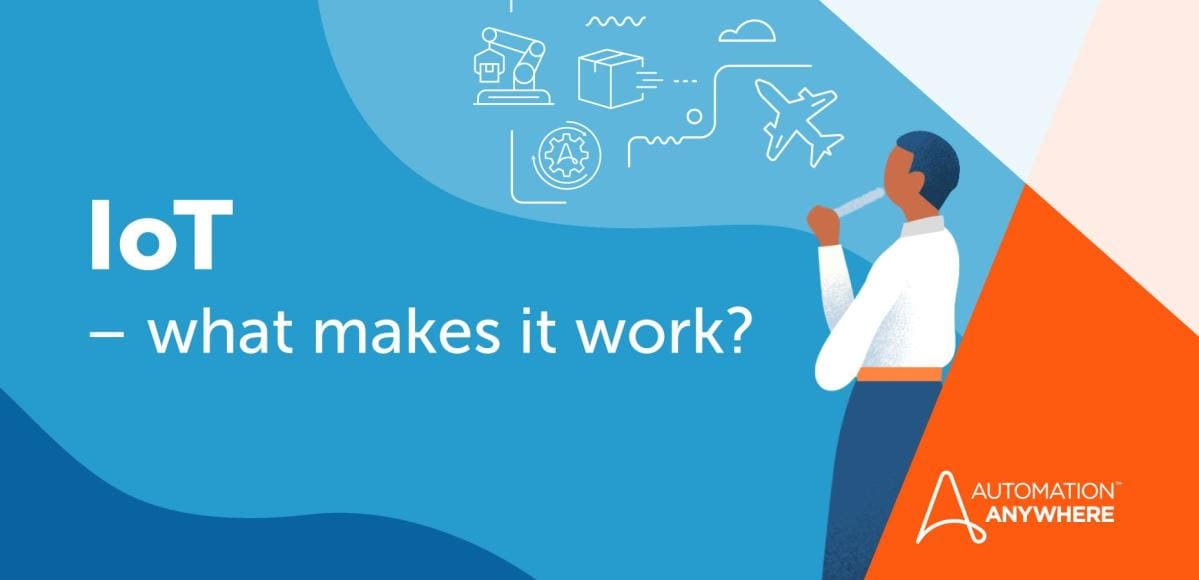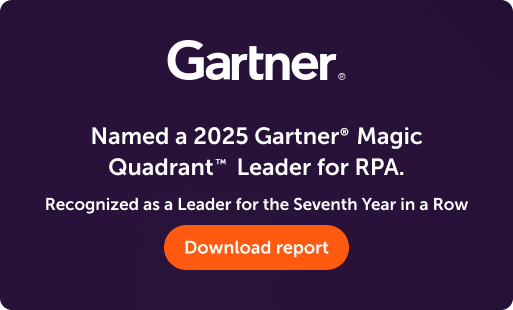- Login
- Search
- Contact Us
-
Have a question? Our team is here to help guide you on your automation journey.
-
Explore support plans designed to match your business requirements.
-
How can we help you?
-
- AI
AI Without the Hype From pilot to full deployment, our experts partner with you to ensure real, repeatable results. Get Started
- Automation Anywhere AI
-
- Solutions
Featured Agentic Solutions
Accounts Payable Invoice automation—No setup. No code. Just results. Accounts Payable
Customer Onboarding Scale KYC/AML workflows. Customer Onboarding
Customer Support Keep queues moving, even at peak load. Customer Support
Healthcare RCM Revenue cycle management that runs itself. Healthcare RCM
- Products
Platform Features
- Agentic process automation (APA)
- Robotic Process Automation (RPA)
- View all Products
-
- Resources
Get Community Edition: Start automating instantly with FREE access to full-featured automation with Cloud Community Edition.
Featured
 Named a 2025 Gartner® Magic Quadrant™ Leader for RPA.Recognized as a Leader for the Seventh Year in a Row Download report Download report
Named a 2025 Gartner® Magic Quadrant™ Leader for RPA.Recognized as a Leader for the Seventh Year in a Row Download report Download report- Become an Expert
- Developer Tools
- Get Support
- View all resources
-
- Partners
Find an Automation Anywhere Partner Explore our global network of trusted partners to support your Automation journey Find a Partner Find a Partner
- Find a Partner
- For Partners
-
Blog
Understanding the Internet of Things (IoT) and Its Connection to Automation
Share this:
Since the term “Internet of Things” was coined in 1999, there’s been a lot of noise around it and its impact on our personal and business lives.
From the way we shop and travel to the way manufacturers monitor and manage inventory to the way farmers keep track of their livestock, IoT has transformed life in many areas and gone from just a crazy vision to an essential reality.
All this can be attributed to drivers of development, such as the rise of ubiquitous computing, extensive use of the internet protocol (IP), continued advancement of data analytics, and more. Gartner predicted that by 2020, about 20.4 billion devices would be connected to the IoT. To some degree, though, it remains an obscure concept despite the benefits it provides.
What is the Internet of Things?
In simple terms, IoT is a giant, digitally connected universe of billions of physical devices around the world; “things” that collect and share data about how they’re used and the environment around them. These objects are embedded with internet connectivity, software, sensors, and other hardware that enable them to connect and exchange data with other systems and devices over the web.
IoT extends the power of the internet beyond smartphones and computers to ordinary household objects such as lightbulbs, locks, smart microwaves, wearable fitness devices, sophisticated industrial tools, and self-driving cars, affording them a higher degree of analytical and computing capabilities.
How automation is connecting the IoT devices
IoT has many uses; however, it depends on key technologies and components to connect devices to the internet, such as:
- Sensors to collect the data from the environment for the IoT system to process it
- Connection and identification from the device to the IoT system through an IP address
- Actuators that allow the devices to take action based on data from their own sensors and network feedback
- IoT gateway to bridge data from the different devices to reach the cloud. It also translates the devices’ protocols into one standard protocol and filters out unnecessary data from the devices.
- The cloud, where all data from the IoT devices is gathered and processed by software
- User interface, from where users get the data from the devices so that they can make the required commands that the devices need to execute
Automation ties all these components together and ensures that processes work smoothly without the involvement of a human being.
The advantages of automation in IoT
Automation offers many advantages to your business processes using IoT.
Increased uptime
Uptime refers to how long your business is open or running. Employees come in and leave at specific times, so unless their shifts overlap, your business will only be open for a specific number of hours every day.
When your business processes are automated, there are no time restrictions, so your business can run around the clock. Your employees will not have to focus on repetitive, manual tasks, freeing them for higher-level work.
In factories, where engineers fix faults in machinery or other devices, automation can save time and efficiency costs because software bots can pinpoint the exact source of the fault and notify engineers so that they can fix it quickly and get things back up and running.
Operational efficiency
In supply chain and asset management, automation and IoT bring intelligence through sensors and scanning technologies. These help companies improve existing technologies such as barcodes by supplementing them with passive radio-frequency identification (RFID) such as tracker tags to perform cycle counts or a global positioning system (GPS) for equipment and fleet management.
Efficient building functionality
Office buildings can also be made more efficient through automating their functionality in terms of environmental requirements such as lighting, humidity control, and more.
Once the bots learn the habits and preferences of the workers on each part of the building, there’s no need to program the smart devices to work. Lights will turn on when needed, and the ideal temperature will be applied based on the environment, leading to significant cost savings on a utility bill.
Improve safety compliance
IoT facilitates workplace safety in many ways. There are several assets within the workplace that, if equipped with sensors, can detect impending part failures and alert maintenance personnel to avoid employee injury from preventable circumstances.
For businesses dealing in perishable goods — whether it’s a production company or retail business — IoT and automation enable better compliance by ensuring refrigerated food products don’t exceed or go below the FDA regulations on temperature thresholds. They can help ensure customers get products that are fit for human consumption and allow for timely response to any problems that arise to avoid recalls.
In factories where manufacturers automate maintenance reporting and diagnostics, the combined solution of automation and IoT can provide information on each aspect of the manufacturing process to reduce accidents and increase efficiency.
Strengthen access control
IoT and automation can work together to power security systems. A combined solution can recognize authorized employees and unlock and lock doors to high-risk facilities such as bank vaults. The technologies can also restrict or grant privileges for operating specific machinery.
This way, IoT and automation help tackle compliance, efficiency, safety, and other longstanding problems.
Enhance customer insights
For retail businesses, sensors and location beacons can yield valuable insights about customer behavior while assisting customers in a variety of ways, such as by providing directions to navigate the store or to find desired products.
Boost conversions
Geofencing and location technologies can deliver insights that businesses can use to see the areas with the most in-store traffic and make better decisions on inventory, layout, and in-store and digital product promotions. They can also reveal the types of customers visiting the location during different times of day, all year round.
Improve operations in the public sector
For governments and service-related sectors, IoT and automation can offer myriad benefits. Public sector utilities can use IoT-enabled applications to help in handling traffic, city governance, public safety, and resource management.
Healthcare benefits
IoT devices can help doctors and other medical personnel monitor their patients remotely, especially if they’re in hazardous conditions. They can also help hospital administrators monitor assets, for example, determining the availability of hospital beds.
Benefits in agriculture
Farmers — especially those with large scale operations — can apply smart farming solutions to monitor crop fields using sensors and automate irrigation systems from anywhere. Livestock owners can utilize wireless IoT apps to get data on the health and well-being of their cattle, including when they’re sick, to prevent the spread of disease, or when they’re about to give birth and where they can be found.
Benefits for consumers
Consumers also have much to gain from automation and IoT. From wearables, such as smartwatches or fitness trackers, which help users better understand their health, to smart speakers like Google Home that makes it easier to get information, set timers, or even play music.
In the kitchen, smart refrigerators send alerts about available stock, smart lightbulbs make it look like you are home when you’re not, smart plugs conserve energy and cut costs, and smart thermostats heat the home before you arrive back.
These are just the tip of the iceberg because the potential uses of IoT and automation are almost unlimited.
Automation Can Help Your IoT Applications.
About Automation Anywhere Staff
Get to know the Agentic Process Automation System.

For Students & Developers
Start automating instantly with FREE access to full-featured automation with Cloud Community Edition.



